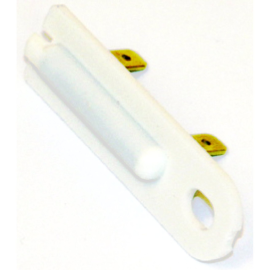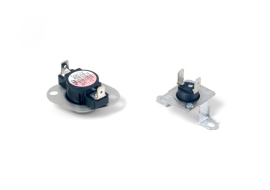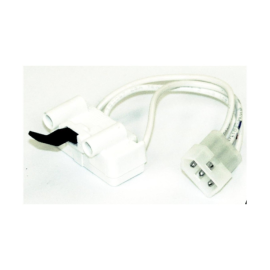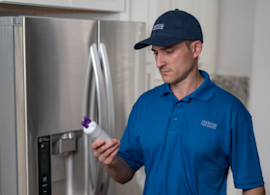How to use your clothes dryer efficiently


Even though your clothes dryer is one of the biggest energy hogs in your home, using it efficiently can save you money on your utility bills and help the environment. Keeping your dryer in top shape with proper maintenance will increase dryer effectiveness and efficiency. Sorting and loading laundry will help your clothes dryer work more efficiently. Selecting the most efficient cycle will save you significant money on your energy bills over time.
Follow these tips to maximize dryer efficiency and minimize energy use.
How to maintain your dryer for efficiency
Keep your clothes dryer clean and well-maintained so it works efficiently and uses less energy. The number one cause of dryer inefficiency is poor maintenance. Make sure your dryer is in top operating condition by following these basic maintenance guidelines.
Clean the lint filter before starting each load
Don’t forget to pull the lint filter out and clean off lint before starting each load in the dryer. A clogged lint filter restricts airflow and makes your dryer work harder, consuming more energy.
Thoroughly wash the lint screen monthly
Fabric softener, often from dryer softener sheets, can build up on your lint screen and inhibit air flow through the dryer. You may not even see the softener residue.
Follow the steps in this video to thoroughly clean the lint screen in your dryer:
Remove the lint screen and wash it with water and soft bristle brush to remove fabric softener and dryer sheet residue that builds up on the lint screen. Let the lint screen dry completely and reinstall it in the dryer.
Repeat this procedure every month to keep air flowing through your dryer so it continues to work efficiently.
Thoroughly clean the dryer exhaust vent system
Lack of exhaust airflow through the exhaust vent system will lengthen dry time and cause your dryer to use much more energy than it’s designed to use. Lint and debris build up in the exhaust vent system over time and clog the vent ducts. Clothes that are tumbling inside a dryer with a clogged vent can overheat. If you notice that it’s hotter than normal in your laundry room, it’s likely time to clean the exhaust vent system. Clean the exhaust vent duct system every few months to avoid clogs completely and keep your dryer working efficiently all the time.
Follow these steps to clean the dryer vent system:
Check the dryer damper vent on the outside of your home. Clear any obstructions that are blocking the damper from opening properly. Clean the damper vent and make sure that it swings freely on its hinge so that exhaust air flows freely out of your home.
Disconnect the flexible exhaust duct from its wall connection. Vacuum lint and dust from the exhaust duct going to the outside of your home.
Use a lint brush or leaf blower to clear lint and debris from the exhaust duct system going through the wall behind your clothes dryer to the outside of your home.
Vacuum lint and debris from the exhaust outlet on the dryer. Reassemble the flexible exhaust duct to restore the air path going to the outside of your home.
Clean the moisture sensor bars
Many clothes dryers have sensor bars that tell the dryer to shut off when the load is dry. If you use dryer sheets, residue from the sheet’s fabric softener can make sensors think the load is dry when it’s still damp. Having to restart the dryer over and over again uses more energy.
Clean the sensor bars every 6 months or so, or if the dryer is consistently leaves the laundry damp. Dip the tip of a rag in rubbing alcohol and wipe the bars to clean off residue.
Schedule Clean & Maintain Service by Sears to keep your clothes dryer working efficiently
Professional maintenance of your dryer by a Sears Technician will ensure that it works at peak efficiency all year long. The technician can clean and check areas that you aren’t able to access yourself. Schedule this maintenance service yearly.
During Sears Cleaning & Maintenance Service, the tech will perform these tasks:
Check the exhaust system.
Inspect the heating system.
Check the drum, drive system and drum seals.
Examine and test the moisture sensor.
Inspect the power cord and electrical connections.
Measure dryer operating temperature.
Check the controls.
Having your dryer professionally cleaned and maintained by Sears every year won’t just keep your dryer working efficiently, it will also help prevent unexpected breakdowns and the dryer will last longer.
Bundle your dryer service with cleaning and maintenance for your clothes washer to keep your washing machine operating properly and efficiently as well. Clothes will dry faster in your dryer when the washer spins water out of the laundry properly. Having your washer professionally maintained will also help the dryer work more efficiently and use less energy to dryer clothes.
How to load the dryer for energy efficiency
Dry similar fabrics together so the clothes dries uniformly. Lightweight fabrics dry faster than heavier ones, so drying similar items together ensures more efficient drying. Also, the moisture sensor will work more accurately when you dry laundry with similar fabrics. Sort your laundry by fabric type and weight before washing.
Don't overload the dryer. Overloading the dryer prevents proper airflow, leading to longer drying times. Leave enough space for the air to circulate freely among the clothes.
Toss a few dryer balls or clean tennis balls into the dryer to help separate the clothes, improving air circulation and reducing drying time.
How to select the right dryer cycle settings for energy efficiency
Use the automatic drying setting that detects when clothes are dry and automatically shuts off the dryer. Using a timed cycle can waste energy because the dryer may continue to heat and run after the clothes are dry.
Choose the Less Dry setting when possible to minimize dry time of garments. This setting doesn’t just reduce energy consumption, it is also useful for gently drying delicate garments that can shrink or get wrinkled when they’re completely dried to a crispy condition. Use the Less Dry setting frequently (or always) to save energy.
Unless you have specific items that require high heat, use lower heat settings. Most clothes can be dried effectively on medium or low heat. High heat settings use more energy and can also damage delicate fabrics.
Turn off the Wrinkle Prevent setting to prevent the dryer from restarting periodically when you leave clothes in the dryer after the drying cycle ends. Remove clothes from the dryer promptly after the cycle ends to efficiently prevent wrinkles. Smart dryers will notify you when the cycle ends so you can avoid wrinkled clothes without using the Wrinkle Prevent setting.
Of course, you can save the most energy to dry clothes by using natural drying methods such as clotheslines or drying racks when possible. This can also help extend the lifespan of your garments.
By following these tips, you can maximize the efficiency of your clothes dryer and reduce energy consumption, ultimately saving money and helping the environment.
Most common symptoms to help you fix your dryers
Choose a symptom to see related dryer repairs.
Main causes: bad gas valve coils, broken heating element, tripped safety thermostat or fuse, bad operating thermostat, c…
Main causes: bad timer or electronic control board, door switch failure…
Main causes: lack of electrical power, bad power cord, wiring failure, bad control board, blown thermal fuse, bad door s…
Main causes: clogged exhaust vent, bad motor relay, loose dryer door catch, bad door switch, control system failure, fau…
Main causes: damaged door strike, worn door catch…
Main causes: bad drum support roller, damaged idler pulley, broken blower fan blade, worn drum glide bearing, bad drive …
Main causes: clogged exhaust system, heating system failure, deposits on moisture sensor, control system failure…
Main causes: door switch failure, lack of power, broken belt, blown thermal fuse, bad drive motor, control system failur…
Most common repair guides to help fix your dryers
These step-by-step repair guides will help you safely fix what’s broken on your dryer.

How to replace a thermal fuse in an electric dryer
When the air in the dryer overheats—usually because the vent is clogged—the thermal fuse blows, stopping the dryer. You …

How to install a thermal cut-off fuse kit in an electric dryer
The thermal cut-off fuse shuts off the heat if the dryer overheats when the high-limit thermostat fails. Install a ther…

How to replace a dryer door switch
The dryer won't start if the door switch isn't working correctly. You can install a replacement dryer door switch in les…
Effective articles & videos to help repair your dryers
Use the advice and tips in these articles and videos to get the most out of your dryer.

Get expert tips on using your dryer efficiently to save energy.…

Learn about all the convenient features on our Sears PartsDirect website that make your parts purchases easier.…

Get answers to frequently asked questions about Sears and Sears PartsDirect.…
